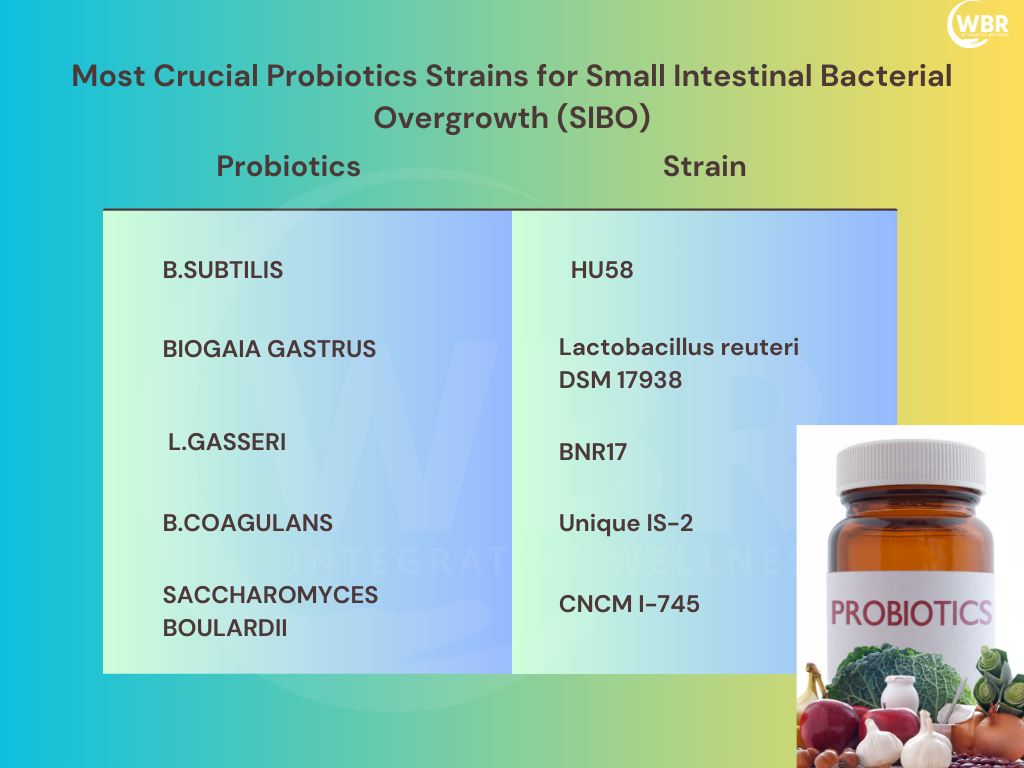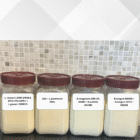Probiotics for Small Intestinal Bacterial Overgrowth (SIBO)
Small Intestinal Bacterial Overgrowth (SIBO) occurs when excessive bacteria grow in the small intestine, leading to uncomfortable symptoms like bloating, gas, diarrhea, and constipation. SIBO affects an estimated 6-15% of the general population and is often linked to conditions such as irritable bowel syndrome (IBS). While antibiotics are the standard treatment, there is growing interest in probiotics as complementary approaches to managing SIBO symptoms. Research suggests that probiotics help restore a healthy gut microbiome. This blog will explore how these treatments support gut health and alleviate SIBO symptoms, offering a holistic alternative or adjunct to traditional therapies.
Understanding SIBO and Its Impact on Gut Health
Small Intestinal Bacterial Overgrowth (SIBO) is a condition where an abnormal increase in bacteria is present in the small intestine, leading to a range of digestive issues. Normally, the small intestine has relatively low levels of bacteria, but in SIBO, this balance is disrupted, often due to factors like impaired gut motility, structural abnormalities, or a weakened immune system. Conditions like IBS (Irritable Bowel Syndrome) are frequently associated with SIBO, with studies showing that 30-80% of people with IBS also have SIBO, indicating a strong overlap between the two.
The symptoms of SIBO are often debilitating, including bloating, excessive gas, diarrhea, and constipation. These symptoms occur due to the fermentation of undigested food by bacteria, which produces gas and causes inflammation. Chronic SIBO leads to nutrient malabsorption, resulting in deficiencies in essential vitamins and minerals, such as vitamin B12, iron, and calcium. The prolonged bacterial overgrowth also contributes to intestinal inflammation, further complicating gut health. This cascade of issues highlights the critical need for effective management of SIBO to restore gut function and overall well-being.

How Probiotics Work for Managing SIBO?
Probiotics in SIBO Management
Probiotics are live microorganisms, often referred to as “good” bacteria, that provide health benefits when consumed in adequate amounts. In the context of SIBO, probiotics play a key role in restoring gut health and alleviating symptoms. By helping to balance the gut microbiome, probiotics serve as a valuable adjunctive treatment for managing SIBO. Here’s how they help:
- Restoring Microbial Balance: Probiotics help outcompete harmful bacteria in the small intestine, promoting the growth of beneficial microorganisms and restoring healthy gut flora.
- Supporting Gut Motility: Probiotics support normal gut movement, which reduces bacterial stagnation in the small intestine, preventing the buildup of harmful bacteria.
- Reducing Inflammation: Probiotics help modulate immune responses, lowering inflammation in the gut and alleviating symptoms like bloating and discomfort.
- Enhancing Digestive Function: By improving the absorption of nutrients and supporting overall digestion, probiotics help address nutrient deficiencies and promote better digestive health in SIBO patients.
Incorporating probiotics into SIBO treatment is an effective way to support gut function and improve the quality of life for those affected.
Most Effective Probiotics for Small Intestinal Bacterial Overgrowth (SIBO) Treatment
Several probiotic strains have shown promise in managing Small Intestinal Bacterial Overgrowth (SIBO) symptoms by restoring balance to the gut microbiome. Here are some of the most effective probiotics for SIBO treatment:
HU58 Bacillus subtilis
- Benefit: This spore-forming strain supports the gut by producing natural antibiotics that inhibit the growth of harmful bacteria, restoring balance in the small intestine.
- Clinical Evidence: A study highlighted that B. subtilis supplementation enhances gut barrier function and reduces pathogenic bacterial load, which is critical for SIBO management.
Lactobacillus Reuteri (ATCC PTA 6475, DSM 17938)
- Benefit: These strains produce bacteriocins, which target and reduce bacterial overgrowth in the upper GI tract, alleviating SIBO symptoms like bloating and discomfort.
- Clinical Evidence: Trials have demonstrated that L. reuteri significantly improves gut motility, reducing the stagnation that leads to SIBO.
Lactobacillus gasseri ( BNR17)
- Benefit: This strain reduces inflammation and improves gut motility, helping to prevent bacterial overgrowth and promote gut health.
- Clinical Evidence: Research showed L. gasseri BNR17 reduced bloating and abdominal pain in IBS patients, conditions often overlapping with SIBO.
Bacillus coagulans (GBI-30 6086)
- Benefit: Known for producing lactic acid, this strain helps lower pH in the gut, creating an environment unfavorable for harmful bacterial growth.
- Clinical Evidence: A study found B. coagulans supplementation improved symptoms like gas and bloating in individuals with digestive disorders, including SIBO.
Other Important Probiotics in SIBO Management
- Lactobacillus rhamnosus
- Benefits: Enhances gut motility, and helps prevent bacterial stasis.
- Mechanism: Promotes movement in the digestive tract, reducing bacterial overgrowth and improving overall gut function.
- Bifidobacterium bifidum
- Benefits: Break down complex carbohydrates and proteins, reducing fermentable substrates that feed pathogenic bacteria.
- Evidence: Clinical studies have shown significant improvement in SIBO patients, particularly in reducing bloating and gas.
- Saccharomyces boulardii
- Type: Saccharomyces Boulardii is a probiotic yeast with anti-inflammatory and gut-modulating effects.
- Research: Proven to reduce symptoms like bloating, gas, and diarrhea in SIBO patients, while also supporting overall gut health.
These probiotics, by restoring microbial balance and supporting gut motility, offer significant relief for those struggling with SIBO symptoms.

Why Probiotic Yogurt is a Game-Changer for Gut Health
Probiotic yogurt goes beyond being a tasty snack—it’s a powerhouse of beneficial bacteria that support overall health. Unlike regular yogurt, it’s enriched with live cultures, offering unique advantages for digestion and immunity. Here’s why probiotic yogurt stands out:
- Enhanced Gut Microbiome Support
Probiotic yogurt is packed with live active cultures like Lactobacillus and Bifidobacterium, which help balance gut bacteria, improve digestion, and alleviate conditions like bloating and IBS. - Boosted Immune Function
Probiotic strains in yogurt strengthen the gut lining and improve the production of antibodies, directly enhancing your body’s immune defense system. - Improved Nutrient Absorption
The active probiotics improve the absorption of key nutrients, such as calcium and magnesium, promoting better bone health and overall well-being.
Incorporating probiotic yogurt into your diet is a simple yet effective step toward optimal health.
Managing Symptoms of SIBO with Probiotics
- Reducing Gas and Bloating
Probiotic strains like B. coagulans and BNR17 L. gasseri alleviate gas and bloating by breaking down fermentable carbohydrates and stabilizing the gut environment. Combining probiotics with products like Biocidin GI Detox, which absorbs excess gas, enhances symptom management. - Relieving Pain and Cramps
Iberogast, a herbal formula, combined with probiotic therapy, reduces intestinal spasms and cramping. For effective relief, 20 drops of Iberogast up to three times a day, alongside probiotics, helps ease discomfort. - Preventing SIBO Relapse
Probiotics such as L. reuteri, known for producing bacteriocins (natural antibiotics), help prevent the recurrence of SIBO by maintaining an inhospitable environment for harmful bacteria in the upper gastrointestinal tract. - Supporting Biofilm Disruption
Biofilms formed by pathogenic bacteria resist treatment. Combining N-acetyl cysteine (600–1200 mg twice daily), combinational interfase product which is combination of polysaccharide-specific enzymes, peptide-specific protease/peptidase complex, lysozyme, Serratia peptidase, and EDTA (as disodium EDTA) with probiotics disrupts these biofilms, enhancing the efficacy of probiotics approach.
Practical Tips for Incorporating Probiotics Therapy into Your Small Intestinal Bacterial Overgrowth (SIBO) Routine
It is important to integrate probiotics thoughtfully to ensure effectiveness and safety. Here are some practical tips for incorporating probiotics into your Small Intestinal Bacterial Overgrowth (SIBO) management plan:
- Dosage and Duration
- Proper Dosing: The recommended dosage for probiotics typically ranges from 10 to 50 billion CFU (colony-forming units) per day, depending on the strain and individual needs.
- Therapy Duration: Probiotics are to be taken long-term for ongoing gut support.
- Potential Side Effects: Probiotics cause mild side effects such as bloating or gas initially, which usually subside as the gut adjusts.
- Consulting Healthcare Professionals
- Personalized Recommendations: It’s essential to work with a doctor or nutritionist when incorporating probiotics therapy into your routine. A healthcare provider helps personalize dosages based on your specific symptoms, medical history, and any other medications or supplements you may be taking.
- Monitoring Interactions: Certain probiotics interact with medications or affect gut flora in different ways, so professional guidance ensures safe and effective use. Also to be chosen carefully in compromised or suppressed immune system
- Symptom Monitoring
- Tracking Progress: Keep a journal of your symptoms to track changes over time. Note improvements or any new symptoms that arise, such as reduced bloating, better digestion, or side effects.
- Adjusting Therapies: Based on symptom tracking, you may need to adjust the dosage or switch probiotics to optimize results. Regular follow-up with a healthcare provider is important to fine-tune the treatment plan.
Conclusion
Managing SIBO is challenging, but incorporating probiotics offers a promising, natural approach to restoring gut health and alleviating symptoms. Probiotics help rebalance the gut microbiome. By personalizing your treatment plan, consulting with healthcare professionals, and monitoring your symptoms, it gets easier to optimize the effectiveness of these remedies. Embracing a holistic approach to SIBO management not only supports immediate symptom relief but also promotes long-term gut health and overall well-being.









